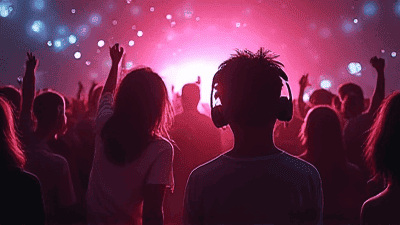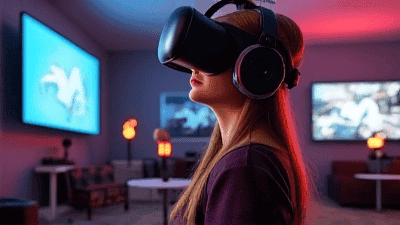
Introduction
Reality television, a ubiquitous fixture across global media landscapes, presents a fascinating paradox. Purporting to showcase authentic, unscripted human behavior, it has evolved into a highly produced genre with significant cultural and economic impact. From competitive challenges to docu-series about everyday lives, its pervasive presence challenges our understanding of authenticity and entertainment, prompting an in-depth exploration of its underlying allure and mechanics.
The genre's meteoric rise reflects a profound shift in audience preferences, highlighting a collective yearning for perceived authenticity, emotional engagement, and relatable narratives. Reality TV has reshaped celebrity culture, influenced social discourse, and created billion-dollar franchises, demonstrating its multifaceted impact on society, the entertainment industry, and even behavioral psychology. Current discussions often revolve around the ethical implications of its production methods and its influence on participant well-being and public perception. What impact would it have on our understanding or practice of media consumption and ethical content creation if we failed to fully comprehend the intricate web of production, psychological appeal, and societal influence that defines reality television?
The Irresistible Pull of Voyeurism and Connection

Decoding the Primal Appeal: Why We Watch Lives Unfold
The enduring appeal of reality television is deeply rooted in fundamental human psychological traits, primarily voyeurism and the desire for social connection. Voyeurism, the pleasure derived from observing others’ private lives, is a powerful, almost primal instinct. Reality TV expertly taps into this by presenting seemingly unmediated access to individuals navigating relationships, challenges, and emotional turmoil. Shows like "Big Brother" create enclosed social experiments, allowing viewers to observe group dynamics, conflicts, and alliances without direct participation. This provides a safe space for fulfilling our curiosity about human behavior and social norms. Furthermore, viewers often form parasocial relationships with contestants, developing a sense of intimacy and connection with characters they see regularly, despite the one-sided nature of the interaction. This fosters empathy and engagement, making the on-screen drama feel more personal and impactful.
Relatability also plays a crucial role; viewers often see aspects of themselves or their own experiences reflected in the contestants, creating a powerful mirror effect. A study by the University of Leicester found that watching reality TV can fulfill a need for social comparison, whether upward (aspiring to be like a successful contestant) or downward (feeling better about one's own life by comparison to those in distress). The drama, conflicts, and triumphs provide both escapism and a lens through which to process real-world emotions and social situations. Whether it is the competitive spirit of "MasterChef" or the relationship struggles in "The Bachelor," these narratives resonate because they mirror universal human experiences.
Crafting the Unscripted: Production Techniques and Narrative Alchemy
Behind the Scenes: How "Reality" is Constructed and Sustained
While marketed as "unscripted," reality television is a sophisticated production, employing specific techniques to craft compelling narratives and sustain audience engagement. Producers meticulously cast individuals with diverse personalities, often chosen for their potential to create conflict or dramatic storylines. The "confessional" format, where contestants speak directly to the camera about their experiences or opinions, is a key tool for driving narrative, revealing inner thoughts, and guiding viewer perception, effectively acting as an ongoing internal monologue. Extensive editing is perhaps the most critical element, transforming hours of raw footage into cohesive, dramatic arcs. Editors manipulate timelines, splice conversations, and add sound effects and music to heighten emotional impact, making moments seem more intense or pivotal than they might have been in real-time. This post-production alchemy ensures that every episode delivers a potent dose of drama, suspense, and resolution, or the tantalizing promise of it.
For instance, consider the elaborate challenges in competition shows like "Survivor" or the structured dates in "Love Island," which are designed not just for entertainment but to expose contestants' personalities under pressure and foster dramatic interactions. The financial success of these productions often hinges on their ability to generate consistent "unscripted" drama.
| Reality TV Subgenre | Key Narrative Elements | Production Investment (Average) | Viewer Engagement (Indexed) |
|---|---|---|---|
| Competition | Challenges, alliances, eliminations | $1M - $5M per season | 8.5/10 |
| Docu-soap | Personal lives, relationships, conflict | $500K - $3M per season | 7.9/10 |
| Renovation/Home | Before & after reveals, budget constraints | $200K - $1M per season | 7.2/10 |
| Dating | Romantic pursuits, emotional vulnerability | $800K - $4M per season | 8.8/10 |
This table illustrates how different subgenres, while varying in production complexity and investment, all leverage specific narrative elements to maximize viewer engagement. Dating shows, for example, often involve high emotional stakes and carefully curated environments to foster rapid relationship development and inevitable drama, leading to high engagement despite significant production costs. The strategic deployment of music, camera angles, and dramatic pauses during pivotal moments – known as "frankenbiting" (piecing together different sound bites to create new dialogue) or "storytelling through editing" – are essential for shaping public perception and ensuring that the narrative arcs are both clear and compelling.
Social Impact and Ethical Considerations

The Double-Edged Sword: Influence and Responsibility in Unscripted Television
The widespread popularity of reality television brings with it significant social and ethical implications. On one hand, it has democratized media, offering platforms for ordinary individuals to achieve fame and share their stories, influencing fashion, slang, and cultural trends. Shows like "Queer Eye" have been praised for fostering empathy and understanding around diverse communities. However, the genre also faces criticism for potential exploitation, manipulation, and the promotion of unrealistic lifestyles. Participants, often vulnerable or seeking validation, can be subjected to intense public scrutiny and negative media portrayals, sometimes leading to long-term psychological distress. The constant pursuit of drama can incentivize producers to create scenarios that push ethical boundaries, blurring the lines between genuine emotion and manufactured conflict.
Concerns about privacy are paramount, as personal lives are laid bare for public consumption, often without a full grasp of the consequences. The "villain" narrative, for example, is a common editorial construct that can severely impact an individual's reputation and mental health. While regulations exist, the rapid pace of production and the subjective nature of "unscripted" content mean that ethical dilemmas frequently arise. A critical understanding of reality TV necessitates acknowledging both its capacity for cultural influence and its inherent responsibilities in portraying human lives with integrity and care. As a form of mass media, its pervasive nature means its impact extends far beyond mere entertainment, shaping societal norms and expectations.
Conclusion
Reality television, far from being a simple, unadulterated glimpse into real lives, stands as a complex, meticulously crafted genre that skillfully harnesses fundamental human psychology and sophisticated production techniques. Its pervasive appeal stems from a potent blend of voyeurism, the desire for social connection, and the relatability of human struggle and triumph. From carefully selected casts to expert editing, every element is designed to amplify drama and ensure viewer engagement, transforming mundane moments into compelling narratives. This intricate alchemy explains why millions remain captivated by seemingly ordinary people navigating extraordinary, often manufactured, circumstances, establishing reality TV as a cornerstone of modern entertainment and a powerful cultural force.
Looking ahead, the landscape of reality television is poised for continued evolution, driven by technological advancements and shifting audience expectations. The rise of interactive platforms and AI-driven content generation could introduce new layers of "unscripted" experiences, blurring the lines between viewer and participant even further. However, these innovations will undoubtedly intensify existing ethical challenges, particularly concerning privacy, consent, and the authenticity of portrayed narratives. The industry will need to navigate these complexities, potentially developing stricter ethical guidelines and fostering greater transparency in production. Continuous critical examination and research into the psychological effects and societal impacts of reality TV will be crucial to ensure its responsible development and to fully understand its ongoing influence on our collective understanding of reality, connection, and entertainment.
Frequently Asked Questions (FAQ)

Q: Is reality TV truly "unscripted," or is it largely manufactured? A: The notion of reality television being entirely "unscripted" is largely a misconception; the reality lies on a spectrum from loosely guided scenarios to heavily influenced and constructed narratives. While participants are rarely given a script in the traditional sense, the environment, situations, and even specific interactions are often meticulously curated and manipulated by producers. Casting is a crucial first step, selecting individuals whose personalities are likely to clash or create drama. Producers then set up specific challenges, dates, or living arrangements designed to elicit particular emotional responses or conflicts. The term "story producers" is common in the industry, highlighting their role in shaping storylines, often through leading questions in confessionals or by orchestrating specific events.
Furthermore, post-production editing is perhaps the most significant tool in manufacturing "reality." Hours of raw footage are condensed, specific moments are highlighted or downplayed, conversations can be reordered or spliced (a technique known as "frankenbiting"), and dramatic music or sound effects are added to enhance tension or emotional impact. This process can completely alter the context or meaning of an event, creating heroes and villains, or amplifying minor disagreements into major conflicts. So, while the dialogue might be spontaneous, the overarching narrative, the emotional arcs, and the ultimate "reality" presented to the audience are very much a product of conscious creative decisions made behind the scenes. It's more accurate to view reality TV as "structured reality" or "produced reality" rather than a true, unmediated mirror of life.
Q: What are the main psychological reasons people get addicted to reality TV? A: The addictive nature of reality TV stems from several potent psychological hooks that tap into fundamental human desires and cognitive biases. Firstly, voyeurism is a primary driver; humans have an innate curiosity about the lives of others, and reality TV offers a guilt-free peek behind the curtain of personal relationships, conflicts, and triumphs. It provides a sense of intimacy and access without the social risks of real-world interaction. Secondly, social comparison plays a significant role. Viewers constantly compare themselves to the contestants, which can boost self-esteem (if they perceive themselves as doing better) or inspire personal growth (if they aspire to be like a successful participant). This comparison helps us gauge our own social standing and norms.
Thirdly, parasocial relationships develop, where viewers feel a one-sided emotional connection and intimacy with the characters they watch regularly. This mimics real friendships, fulfilling needs for connection and belonging. Fourthly, reality TV often provides a powerful sense of escapism. By immersing themselves in the drama and challenges of others, viewers can momentarily forget their own worries and responsibilities. Finally, the narrative structures are designed for habit formation and anticipation. Cliffhangers, episodic conflicts, and character development create a compelling feedback loop, making viewers eager for the next installment to see how situations resolve or evolve. The emotional rollercoasters, from joy to anger to sadness, also provide a vicarious emotional release, making the viewing experience intensely engaging and deeply satisfying on a psychological level.








